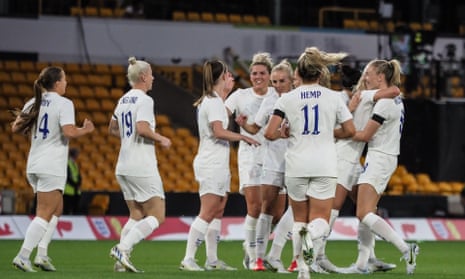When the Lionesses run out on to the Old Trafford pitch to play against Austria on Wednesday, thus opening the delayed 2021 Euros, they will be well on their way to capping a breakthrough year for women’s football in England. An unprecedented 450,000 tickets have been bought so far across the 25 days of the competition; the final sold out in an hour, putting it on course to break attendance records at any Euros, male or female. The tournament is already Europe’s biggest-ever women’s sporting event.
This change has been bubbling through for a while. There had already been a decade of improvements in girls’ and women’s football when the Football Association published its 2017 Gameplan for Growth. The specific targets – to double participation and attendance at matches – were not only met but exceeded within three years; the goal of consistent success on the world stage was met when the Lionesses reached the semi-finals in both the 2017 Euros and the 2019 World Cup. In 2019 Barclays began sponsoring the Women’s Super League, investing £15m; it has since committed another £30m. Last year the BBC and Sky Sports announced investment of £24m over three years. Since then there has been a fourfold increase in viewing figures. Alex Scott, a former England and Arsenal women’s player, is a familiar face on both broadcasters, offering insightful opinions on the men’s and women’s games.
Not all is rosy. There has been criticism that the FA, which governs the sport in England, has underestimated attendance at this month’s tournament, meaning that some stadiums, chosen in 2018, are too small. More generally, the number of black and mixed-race players in the England squad has dropped; female commentators report routine abuse and death threats; there may be parity of pay between the England teams, but in the leagues men can still outearn women by a factor of 50.
The Lionesses, with an unbeaten record under coach Sarina Wiegman, go into the Euros as one of the favourites. The 5-1 thumping of reigning European champions Holland last week will have done their confidence no harm. Professionalisation has helped the sport to grow. It would be good for women’s football to develop outside the men’s sport. It is a little disappointing that in the current Women’s Super League for a side to be successful, it is almost always linked to a well-known men’s team. But one of the benefits of the BBC’s wall-to-wall coverage of the tournament is that it promises to make household names of the female players.
As Suzanne Wrack’s new book A Woman’s Game reminds us, women were banned from playing in FA-affiliated grounds for 50 years. Between 1921 and 1971, the FA prohibited women from using the grounds of professional men’s teams, claiming that the sport was “quite unsuitable for females and ought not to be encouraged”. Today, it is hard to avoid this summer’s women’s Euros. Players adorn the billboards and adverts of sponsors. All this only underlines, however, just how important the next month could be in the history of the women’s game in this country. There is all to play for.
